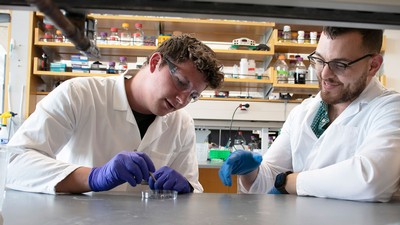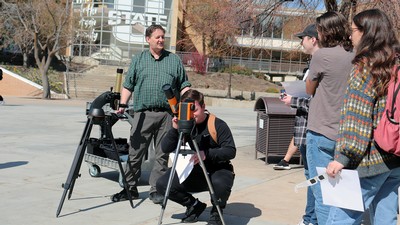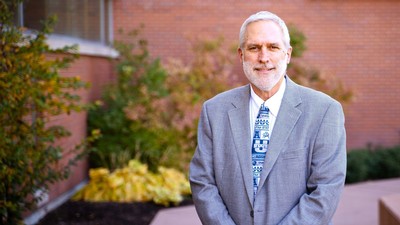Stress Still Disabling Vietnam Vets
By Karina Velez, originally published in the Hard News Café
May 16, 2005 | The newlyweds lie asleep in their bed. Suddenly she feels his hand across her face. He jumps out of bed screaming, yelling for her to run. She shakes him to consciousness.
He realizes, it's over.
There are no Viet Cong attacking — just a dresser, a bed and a nightstand.
Tony Rodriguez suffers from post-traumatic stress disorder (PTSD), also known as "shell-shock." Almost all Vietnam veterans suffer from PTSD to a degree. For some it may not affect their daily lives, but others are 100 percent disabled.
PTSD is "the development of characteristic symptoms following exposure to an extreme traumatic stressor involving direct personal experience of an event that involves actually or threatened death or serious injury," according to the Vietnam Veterans of America Guide on PTSD.
According to the Associated Press, a National Vietnam Veterans Readjustment Study found that 31 percent of soldiers — almost 1 million troops — who went to Vietnam succumbed to PTSD after their return home.
Tony Rodriguez served in Vietnam from 1969 to 1970.
"I served all over, I started off in south Vietnam by the end we crossed the Cambodian border," said Rodriguez.
"I enlisted in the Army and didn't even tell my parents until a few days before I left, then when I got sent off to Vietnam. I never told them I left Boot Camp in Georgia until six months later. I didn't want them to worry," said Rodriguez.
"It was a tough time because the war was such a controversial issue, not everyone supported us going over there," he said.
He said he thinks that was a big contributor to why many soldiers had a hard time coming home and feeling depressed. They weren't seen as heroes, as were many of the soldiers who returned home after World War II.
"We had to have guards escort us from the plane when we landed back here in San Francisco, there were a ton of people protesting against the war, but you feel like they're protesting against you personally," said Rodriguez.
Lt. Col. Jeff Bateman, a USU professor of aerospace studies, said it adds to the stress when soldiers fight in a war that their home nation does not support, and "no one gave a crap about you."
It's a complex thing — the community reaction and family life after returning home make a difference, said Bateman.
Paul Davis, a field artillery solider who served in the northern end of South Vietnam, in Dong Ha, from 1970 to 1971, said PTSD affects everyone differently.
"It really depends on the support you have waiting for you when you get home," Davis said.
"There was not a great deal of pride coming home wearing a uniform at that time."
Fred Trujillo served in the 21st Military Command on the Cambodian border in Pleiku and gave two years as a search and destroy Ranger.
"Fighting was my life for two years," said Trujillo.
"No one was there to greet us [at home]. It was an unpopular war at an unpopular time, I know how it is to have someone look down at you and say, 'Hey, you're a piece of crap, or not to care if you're dead or alive,'" he said.
"It wasn't a war to help people, it was a political war, there wasn't a lot of heart in that war by '67, everyone knew what reality was."
Trujillo and Davis believe that those who had a shallow belief system had more problems with PTSD.
"It helped a lot having family, to get back into the routine," said Davis.
Jim Tourila, a psychologist at St. Cloud VA Medical Center, told the Associated Press last year, "You can't send people off to war and not expect them to come back without psychological problems; you can't train somebody to kill and not be bothered by it."
Rodriguez said: "I always had nightmares about the huge spiders over there. Like they were crawling all over me and my wife. I would start swatting them off her in my sleep, and then I would wake up. I could see the look in her eye, like she thought I was crazy, ya know."
According to the veterans' guide on PTSD, the traumatic event can be re-experienced in many ways. Normally, the person has repeated and intrusive memories of the event or recurrent distressing dreams during which the event is replayed.
"Sleeping was always the hardest thing for me when I got back. In Vietnam you're trained to sleep with one-eye open, literally. The night was not meant for sleeping during war, I dreaded the nights the most. It took me months to just relax and enjoy a good night sleep," said Rodriguez.
The veterans' guide said a major problem is persistent anxiety or increased arousal that was not present before the trauma. Symptoms may include difficulty falling or staying asleep that may be due to recurrent nightmares.
"Hell, I couldn't even sit in a movie theater with people behind me for a while. I was always paranoid, looking back," Rodriguez said. "Most of us were just kids out there; it left a mark that still, can never be erased."
"To this day I can't take a shower home alone with the door shut," said Trujillo.
Davis added, "You're a little jumpy, you don't get over listening to those sounds."
PTSD has been around since the stone-age when warriors were beating each other with clubs. In 1980, the American Psychiatric Association designated PTSD to describe a delayed-stress syndrome frequently experienced by combat-veterans. Post-traumatic stress is one of the most frequently diagnosed psychiatric disorders among troops who've been in combat, Tuorila said.
"You define your security where your at and what your used too," said Davis. Soldiers are vulnerable outside their comfort zone. "The only way to maintain your sanity is to say, 'OK, I'm safe here.' We had a guy shoot himself in the foot with an M-16 to get off the field."
It wasn't uncommon for someone to go crazy, said Trujillo.
"I had a radio operator who went wacko; he went hysterical. I pinned him to the ground and shot him full of Thorazine and called him a chopper. Never saw him after that," said Trujillo.
Thorazine is used for the treatment of schizophrenia (severe disruptions in thought and perception). It can also be used for short-term treatment of sever behavioral disorders in children, including explosive hyperactivity and combativeness; and for the hyper-energetic phase of manic-depressive illness according to Healthsquare.com.
"Most people dealt with it with drugs and alcohol. I would trade our rations, 5 pounds of whiskey for 50 pounds of meat," said Trujillo.
"Soldiers would drink 84 cases of beer in a week," said Davis.
Drugs became a large problem in Vietnam — mostly marijuana and heroin.
When it came time for those soldiers to go home they would send them to headquarters, and keep them there until they were clean.
"They called it pissing positive — you had to be 99 percent pure, as soon as your were clean you were sent home," said Davis.
Now things are different, said Bateman.
"We're professional soldiers. The military today is extremely intolerant of drug abuse," he said.
Today, the military deploys teams into sessions with social workers and/ or psychologists. Soldiers talk about what they've seen and participated in.
"It's a way to defuse it," said Bateman.
It's a way to sit down with people who have been in combat, a way to get thing out on the table. It goes a long ways, helping them feel like their not alone.
"The military has done a lot to be proactive, you don't wait for the problem to happen, the Army is trying really hard to recognize that it does happen," said Bateman.
Back then, it was not uncommon to come back to a broken home, wives who have sold their homes, gone and remarried, said Trujillo Today, many Americans may not support the latest war, but they are a lot better about supporting the troops, said Bateman.
Comments and questions regarding this article may be directed to the contact person listed on this page.





